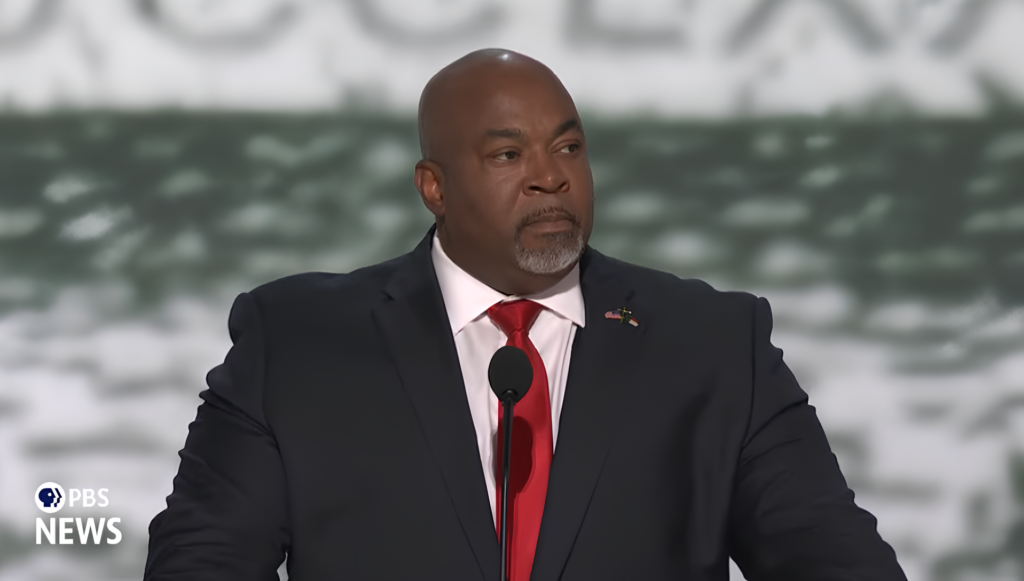Mark Robinson Faces Allegations of Frequenting Adult Video Stores During the 1990s

North Carolina’s Republican nominee for governor, Lt. Gov. Mark Robinson, is facing allegations related to his past frequenting of adult video stores in Greensboro during the 1990s and early 2000s. These claims, which have surfaced just as Robinson’s political career has gained momentum, paint a complex picture of a man who has become a controversial figure in state politics. Robinson’s campaign has strongly denied these allegations, dismissing them as fabrications, according to The Assembly.
Allegations and Denials
The allegations stem from statements made by Louis Money, a former employee at several of Greensboro’s 24-hour video-pornography stores. Money alleges that Robinson was a frequent visitor, sometimes coming in as many as five nights a week to watch pornographic videos in private booths. According to Money, Robinson also purchased numerous bootleg porn tapes, including some that were too explicit to be legally sold in North Carolina at the time.
Despite these detailed claims, Robinson’s campaign has vehemently denied the accusations. Mike Lonergan, Robinson’s spokesperson, labeled the allegations as “complete fiction” and criticized both Money and The Assembly for spreading what he called baseless lies. Lonergan further dismissed the claims, referring to them as a personal attack on Robinson’s character, fueled by individuals with questionable credibility.
Robinson’s Early Life and Struggles
Mark Robinson’s life in the 1990s was marked by significant personal and financial struggles. In his memoir, We Are the Majority, Robinson recounts his journey during this period, acknowledging that he was not yet fully grounded in his Christian faith. He described his life at the time as one filled with challenges, including financial instability and a lack of direction.
During this period, Robinson was a young husband and father, working various jobs in the restaurant and manufacturing industries to support his family. He admitted to making poor financial decisions, which eventually led to multiple bankruptcies and other financial difficulties. Robinson’s struggles during these years, coupled with his eventual commitment to Christianity, have been central to his narrative of personal redemption and transformation.
Contradictory Accounts
The allegations made by Money, however, challenge this narrative. Money claims that Robinson’s visits to adult video stores were a regular occurrence during these formative years. He described Robinson as a familiar face at the establishments, often seen after his shifts at local pizza restaurants. According to Money, Robinson’s purchases included bootleg tapes, one of which he allegedly never paid for.
Robinson’s campaign has countered these claims by pointing to inconsistencies in Money’s story. They have also highlighted Money’s criminal record, which includes misdemeanor drug charges, to question his credibility. In response, Money has admitted to his past legal troubles but insists that his account of Robinson’s activities is accurate.
Public Perception and Political Implications
As Robinson campaigns for governor, these allegations could complicate his efforts to present himself as a moral and principled leader. His strong stance on conservative Christian values, particularly his criticism of pornography and LGBTQ+ issues, contrasts sharply with the image portrayed by these accusations. While some may view these allegations as politically motivated, others may see them as a reflection of unresolved aspects of Robinson’s past.
Robinson’s political rise began with a viral pro-gun rights speech in 2018, which propelled him into the national spotlight. Since then, he has become a prominent figure in North Carolina politics, known for his outspoken views on a range of issues, including gun rights, abortion, and education. Despite his controversial remarks, Robinson has garnered significant support within the Republican Party, winning the nomination for governor with ease.
Looking Forward
As the general election approaches, Robinson’s campaign will likely continue to face scrutiny over these allegations. How voters respond to these claims, and whether they believe Robinson’s denials, could play a crucial role in the outcome of the election. Robinson has attempted to moderate some of his positions to appeal to a broader electorate, but the controversy surrounding his past may complicate these efforts.
The allegations against Robinson also highlight broader questions about how past behaviors and personal transformations are judged in the political arena. For some voters, Robinson’s acknowledgment of his troubled past and subsequent conversion may reinforce his appeal as a candidate who has overcome adversity. For others, the contrast between his past actions and his current political platform may raise concerns about his authenticity and integrity.

